Unit 8 Have you read Treasure Island yet? Section A 3a-3c课件(共15张PPT,内嵌音频)2022-2023学年人教版英语八年级下册
文档属性
| 名称 | Unit 8 Have you read Treasure Island yet? Section A 3a-3c课件(共15张PPT,内嵌音频)2022-2023学年人教版英语八年级下册 | 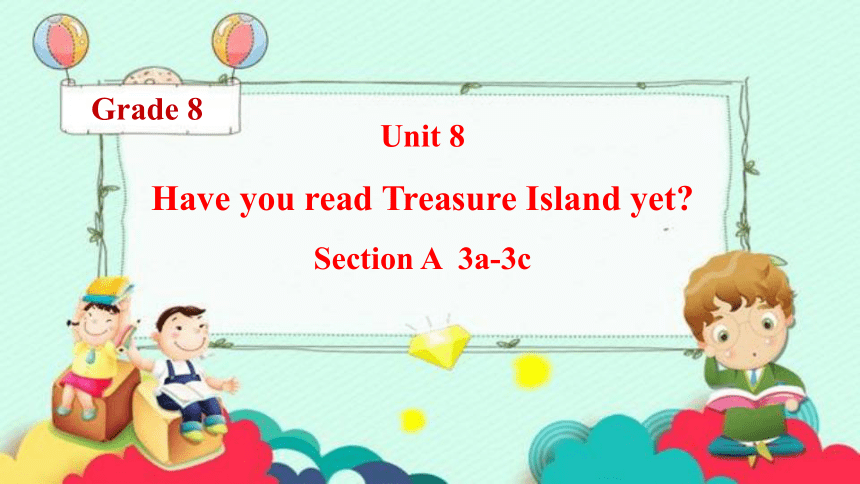 | |
| 格式 | pptx | ||
| 文件大小 | 6.2MB | ||
| 资源类型 | 教案 | ||
| 版本资源 | 人教新目标(Go for it)版 | ||
| 科目 | 英语 | ||
| 更新时间 | 2023-04-24 13:56:58 | ||
图片预览

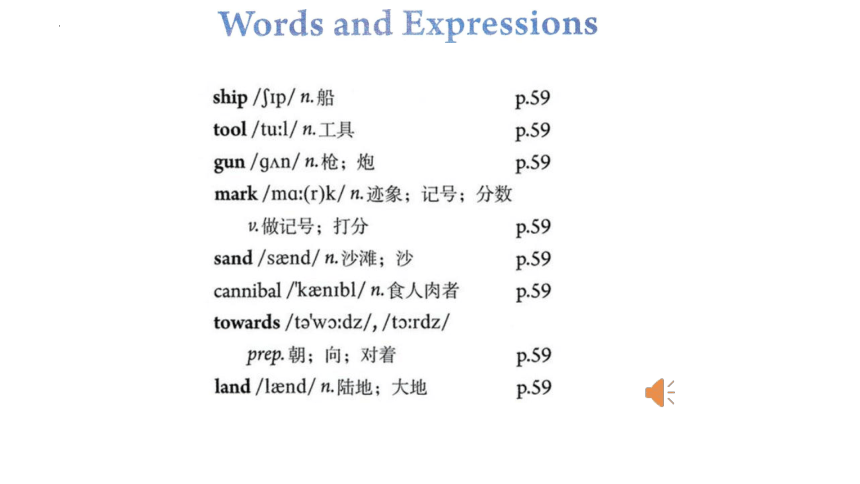

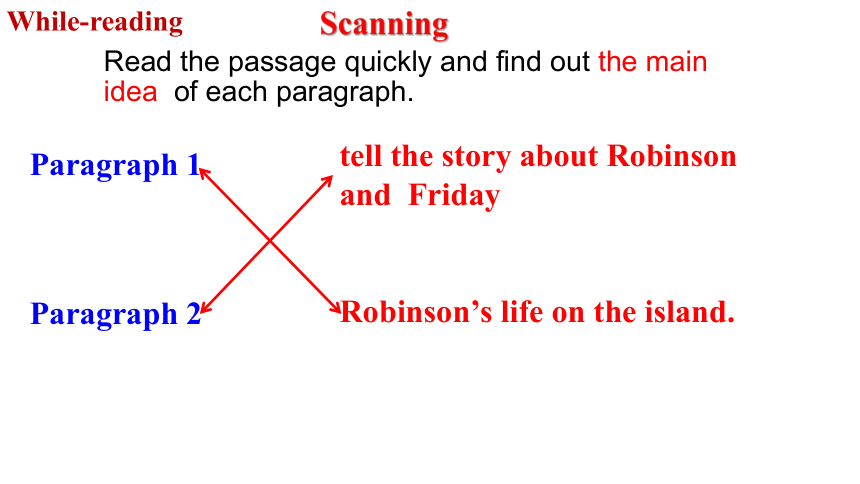
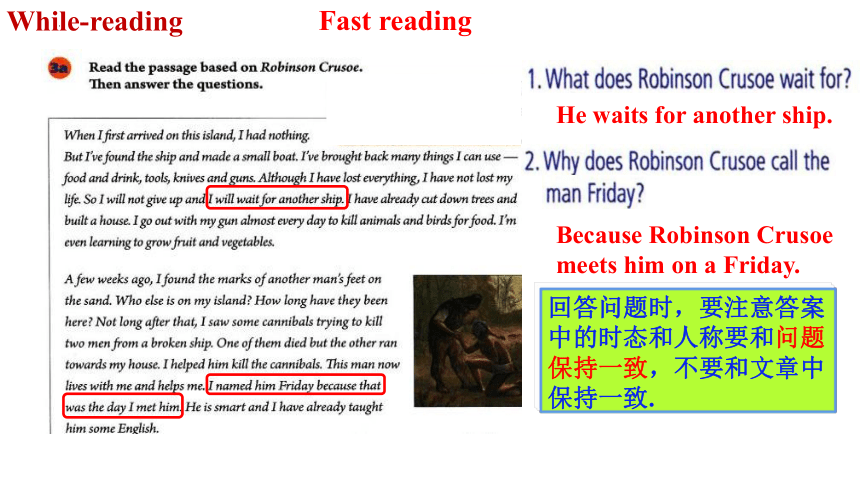

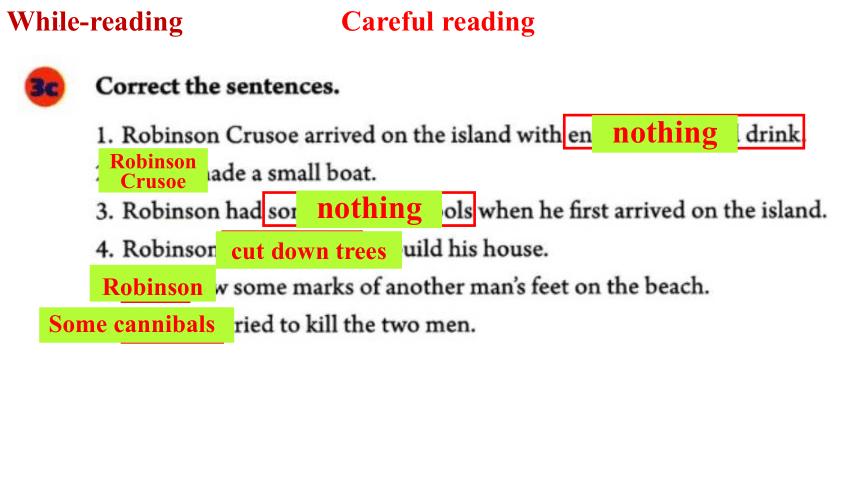
文档简介
(共15张PPT)
Grade 8
Unit 8
Have you read Treasure Island yet
Section A 3a-3c
Which movie part is this
Leading-in
Ask and answer
Robinson Crusoe’s part.
Have you read Robinson Crusoe
Yes, I have. / No, I haven’t.
If you have read the book, what do you think of this story
Exciting; brave; boring …
Now let’s read the part of this story.
Read the passage quickly and find out the main idea of each paragraph.
Robinson’s life on the island.
tell the story about Robinson and Friday
Paragraph 1
Paragraph 2
While-reading
Scanning
While-reading
Fast reading
He waits for another ship.
Because Robinson Crusoe meets him on a Friday.
回答问题时,要注意答案中的时态和人称要和问题保持一致,不要和文章中保持一致.
While-reading
Careful reading
guns
ship/boat
island
knives
marks
While-reading
Careful reading
nothing
Robinson Crusoe
nothing
cut down trees
Robinson
Some cannibals
Explaination
another 既可用作形容词,也可用作代词。用作形容词时,意思是“又一的;再一的”,修饰名词,位于名词前;用作代词时,意思是“另一个”,表示三者或以上中的另一个。
辨析:the other …表示(两者中的)另一个,常与one连用。one … the other …表示“一个… …另一个… … ”
He opened one eye and then opened the other.
This coat is a little short for me. Please show another one to me.
learn to do sth. 意为“学会做某事”
归纳:want, would like, plan, decide, need, volunteer, hope, wish等动词后面跟动词作宾语时,动词必须用动词不定式形式,即to + 动词原形。
Post-reading
Explaination
name vt. 给…取名;为…命名;确定…的名字
The man has named his son Jack.
Post-reading
else adj. & adv. 意为“别的;其它的”
else常放在疑问代词who,what,which等后面和something,anything,nothing,anyone,everyone等不定代词之后。或者放在
when, where, how后面。
What else do you want?
Nothing else.
Where else do you want to go
辨析:other 也有“别的;其它的”意思,但other必须用在名词前
Post-reading
找出现在完成时态的谓语动词
Post-reading
Listen and repeat.
arrive on this island
make a boat
bring back
give up
wait for
cut down
build a house
到达这个岛
制作船
带回来
放弃
等候
砍倒
建房子
Post-reading
Important Phrases
kill … for food
the marks of another man’s feet
who else
see sb. doing sth.
run towards...
help sb. do sth.
name sb. …
teach sb. sth.
杀死……作为食物
另一个人的脚印
还有谁
看见某人正在做某事
朝……跑
帮助某人做某事
给某人起名为……
教某人某事
Post-reading
Important Phrases
Exercises
用所给词的适当形式填空
1. —Have you (find)your knife yet
—Not yet.
2. —When you (come)back
—An hour ago.
3. We can see some children (play)games now.
4. — you (write)a letter to your aunt yet
—No,I haven’t. I (write)it next week.
5. they (see)the teacher just now
found
did come
playing
Have written
will write
Did see
Finish the exercises in the workbook.
Homework
Grade 8
Unit 8
Have you read Treasure Island yet
Section A 3a-3c
Which movie part is this
Leading-in
Ask and answer
Robinson Crusoe’s part.
Have you read Robinson Crusoe
Yes, I have. / No, I haven’t.
If you have read the book, what do you think of this story
Exciting; brave; boring …
Now let’s read the part of this story.
Read the passage quickly and find out the main idea of each paragraph.
Robinson’s life on the island.
tell the story about Robinson and Friday
Paragraph 1
Paragraph 2
While-reading
Scanning
While-reading
Fast reading
He waits for another ship.
Because Robinson Crusoe meets him on a Friday.
回答问题时,要注意答案中的时态和人称要和问题保持一致,不要和文章中保持一致.
While-reading
Careful reading
guns
ship/boat
island
knives
marks
While-reading
Careful reading
nothing
Robinson Crusoe
nothing
cut down trees
Robinson
Some cannibals
Explaination
another 既可用作形容词,也可用作代词。用作形容词时,意思是“又一的;再一的”,修饰名词,位于名词前;用作代词时,意思是“另一个”,表示三者或以上中的另一个。
辨析:the other …表示(两者中的)另一个,常与one连用。one … the other …表示“一个… …另一个… … ”
He opened one eye and then opened the other.
This coat is a little short for me. Please show another one to me.
learn to do sth. 意为“学会做某事”
归纳:want, would like, plan, decide, need, volunteer, hope, wish等动词后面跟动词作宾语时,动词必须用动词不定式形式,即to + 动词原形。
Post-reading
Explaination
name vt. 给…取名;为…命名;确定…的名字
The man has named his son Jack.
Post-reading
else adj. & adv. 意为“别的;其它的”
else常放在疑问代词who,what,which等后面和something,anything,nothing,anyone,everyone等不定代词之后。或者放在
when, where, how后面。
What else do you want?
Nothing else.
Where else do you want to go
辨析:other 也有“别的;其它的”意思,但other必须用在名词前
Post-reading
找出现在完成时态的谓语动词
Post-reading
Listen and repeat.
arrive on this island
make a boat
bring back
give up
wait for
cut down
build a house
到达这个岛
制作船
带回来
放弃
等候
砍倒
建房子
Post-reading
Important Phrases
kill … for food
the marks of another man’s feet
who else
see sb. doing sth.
run towards...
help sb. do sth.
name sb. …
teach sb. sth.
杀死……作为食物
另一个人的脚印
还有谁
看见某人正在做某事
朝……跑
帮助某人做某事
给某人起名为……
教某人某事
Post-reading
Important Phrases
Exercises
用所给词的适当形式填空
1. —Have you (find)your knife yet
—Not yet.
2. —When you (come)back
—An hour ago.
3. We can see some children (play)games now.
4. — you (write)a letter to your aunt yet
—No,I haven’t. I (write)it next week.
5. they (see)the teacher just now
found
did come
playing
Have written
will write
Did see
Finish the exercises in the workbook.
Homework
同课章节目录
- Unit 1 What's the matter?
- Section A
- Section B
- Unit 2 I'll help to clean up the city parks.
- Section A
- Section B
- Unit 3 Could you please clean your room?
- Section A
- Section B
- Unit 4 Why don't you talk to your parents?
- Section A
- Section B
- Unit 5 What were you doing when the rainstorm came
- Section A
- Section B
- Review of Units 1-5
- Unit 6 An old man tried to move the mountains.
- Section A
- Section B
- Unit 7 What's the highest mountain in the world?
- Section A
- Section B
- Unit 8 Have you read Treasure Island yet?
- Section A
- Section B
- Unit 9 Have you ever been to a museum?
- Section A
- Section B
- Unit 10 I've had this bike for three years.
- Section A
- Section B
